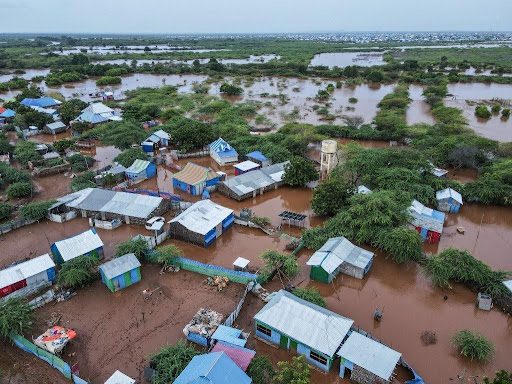

The African Continental Free Trade Area (AfCFTA) represents a transformative milestone in Africa’s pursuit of economic integration and sustainable development. Uniting 55 nations into the world’s largest free trade area, encompassing a market of 1.3 billion people and a combined GDP of $3 trillion, the AfCFTA is uniquely positioned to redefine Africa’s economic trajectory. The African Trade Report 2024 by the African Export-Import Bank (Afreximbank) underscores this potential, emphasizing not only its capacity to stimulate intra-African trade and economic growth but also its critical role in addressing climate change—a pressing global challenge disproportionately affecting Africa. By examining the intersections of trade, resilience, and climate action, this analysis highlights how the AfCFTA can serve as a cornerstone of Africa’s sustainable future.
Africa occupies a distinctive position in the global climate discourse. While contributing a mere 3.78% of global greenhouse gas emissions, the continent bears the brunt of climate impacts. From prolonged droughts and devastating floods to rising sea levels, extreme weather events have inflicted significant socio-economic and environmental damage. In 2023 alone, catastrophic events such as the flooding caused by Storm Daniel in Libya and severe droughts in the Horn of Africa displaced millions, disrupted livelihoods, and imposed billions in recovery costs.
These climate shocks exacerbate Africa’s existing developmental challenges. According to the report, approximately 600 million Africans lack access to electricity, while over 950 million lack clean cooking fuels. Furthermore, 38% of the population lives in extreme poverty, with 160 million experiencing acute food insecurity. Addressing climate change, therefore, transcends environmental necessity, becoming a matter of socio-economic survival.
The AfCFTA emerges as a potential mitigator of these crises. By fostering intra-African trade, reducing dependency on distant markets, and encouraging localized production, the agreement has the capacity to bolster Africa’s resilience to climate shocks while driving sustainable economic growth.
The AfCFTA is not merely a trade agreement; it is a framework for industrialization, economic diversification, and climate action. By eliminating tariffs on 97% of goods traded within Africa and addressing non-tariff barriers, the agreement facilitates the seamless movement of goods and services across the continent. This realignment is anticipated to significantly curtail transportation-related carbon emissions as goods are redirected to regional markets, reducing reliance on long-distance trade routes.
Les African Trade Report 2024 provides robust evidence of this potential. Under optimal implementation scenarios, the AfCFTA could elevate Africa’s GDP by 0.91% and intra-African trade by 33%, while limiting carbon emissions growth to just 0.08%. This equilibrium underscores the agreement’s ability to harmonize economic advancement with environmental stewardship.
Value addition constitutes another critical dimension of the AfCFTA’s climate strategy. Africa’s current trade with external partners is predominantly raw-material focused, with commodities exported for processing and subsequently re-imported as finished goods. This practice not only undermines economic gains but also escalates emissions linked to extensive transportation. By incentivizing local processing industries, the AfCFTA offers a pathway to reduce emissions, generate employment, and amplify economic value. For instance, Kenya—a prominent textile exporter—could leverage the AfCFTA to prioritize regional markets, mitigating reliance on distant buyers while fostering a sustainable trade ecosystem.
The AfCFTA’s emphasis on intra-African trade aligns with broader continental efforts to enhance regional cooperation. Initiatives such as the Pan-African Payment and Settlement System (PAPSS) and the Intra-African Trade Fair (IATF), both supported by Afreximbank, strengthen the institutional frameworks needed for seamless economic integration. These programs not only facilitate cross-border transactions but also enable African businesses to scale operations and innovate within a unified market.
Moreover, the Nairobi Declaration on Climate Change, adopted by African leaders in 2023, explicitly recognizes the AfCFTA as a pivotal instrument for addressing the dual imperatives of climate action and sustainable development. The declaration advocates for investments in renewable energy, climate-resilient infrastructure, and sustainable agricultural practices—areas where the AfCFTA can play a transformative role. By fostering robust regional value chains and reducing dependence on imported goods, the agreement paves the way for accelerated adoption of green technologies across industries.
Despite its transformative potential, the AfCFTA’s implementation is fraught with challenges. Many African nations remain heavily dependent on fossil fuels for energy and fiscal revenue. The report cautions that premature divestment from fossil fuels, without adequate economic diversification, could result in substantial GDP contractions—estimated at $30 billion for Nigeria and $22 billion for Algeria. Balancing the urgency of decarbonization with the imperatives of economic growth remains a critical policy conundrum.
Energy poverty further compounds these challenges. With per capita electricity consumption in Africa averaging just 0.636 MWh—a fraction of global standards—addressing energy access is paramount. The AfCFTA has the potential to incentivize investments in renewable energy infrastructure and enhance energy efficiency across sectors. Regional energy markets, for instance, could facilitate the trade of electricity generated from renewable sources, reducing reliance on conventional fossil fuels.
Policy harmonization also emerges as a prerequisite for effective implementation. Aligning trade, energy, and climate policies across member states is essential for maximizing the AfCFTA’s benefits. This includes standardizing regulatory frameworks, upgrading infrastructure, and ensuring equitable access to trade opportunities. Collaborative efforts involving governments, private enterprises, and development partners will be indispensable in overcoming these barriers and realizing the agreement’s full potential.
The AfCFTA’s strategic potential extends far beyond immediate economic gains. By fostering industrial transformation and embedding sustainability into trade practices, the agreement positions Africa as a global leader in climate-resilient development. The report underscores that aligning AfCFTA implementation with climate-smart policies could amplify its impact, enabling Africa to simultaneously achieve economic growth and emissions reductions.
Investments in renewable energy infrastructure, supported by innovative climate finance mechanisms, could accelerate Africa’s transition to a low-carbon economy. Additionally, promoting green manufacturing and sustainable agriculture under the AfCFTA’s framework could strengthen food security, create employment, and alleviate poverty—outcomes that align seamlessly with global sustainability objectives while addressing Africa’s unique development priorities.
Advocacy on the international stage is equally critical. African leaders must leverage forums such as the United Nations Climate Change Conference to secure financial commitments and promote equitable trade policies. By positioning the AfCFTA as a model for sustainable development, Africa can influence global narratives on trade, equity, and climate action.
Les African Trade Report 2024 underscores the AfCFTA’s transformative potential as both an economic catalyst and a mechanism for climate resilience. By fostering intra-African trade, enhancing value addition, and promoting green growth, the agreement offers a comprehensive framework to address the continent’s most pressing challenges.
As Africa grapples with the intertwined complexities of climate change and economic development, the AfCFTA stands out as a beacon of opportunity. Its success hinges on the collective commitment of governments, private sector actors, and citizens to actualize its vision of a unified, sustainable, and prosperous Africa. The AfCFTA is not merely a trade agreement; it is a strategic blueprint for resilience, growth, and global leadership


